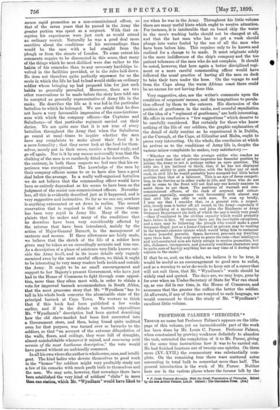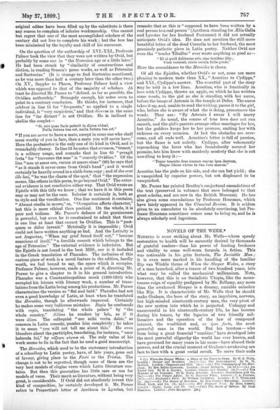PROFESSOR PALMER'S " HEROIDES."* THOUGH no name but Professor Palmer's
appears on the title- page of this volume, yet no inconsiderable part of the work has been done by Mr. Louis C. Purser. Professor Palmer, when constrained by growing weakness definitely to abandon the task, entrusted the completion of it to Mr. Purser, giving at the same time instructions how it was to be carried out. He had finished fourteen out of twenty-one epistles. On three more (XV.-XVII.) the commentary was substantially com- plete. On the remaining four there were scattered notes amounting in total bulk to somewhat more than half. The general introduction is the work of Mr. Purser. Neither here nor in the various places where the lacunte left by the: • P. Ovidi Naaonia Heroidea. With the Greek Translation of Mann**. Milted by the late Arthur Palmer, IAMB. Oxford: The Clarendon Prem. [21a.] original editor have been filled up by the substitute is there any reason to complain of inferior workmanship. One cannot but regret that one of the most accomplished scholars of the century did not live to complete his work ; but the loss has been minimised by the loyalty and skill of his successor.
On the question of the authorship of XVI.-XXL, Professor Palmer took the view that they were not written by Ovid, but probably by some one in "the Neronian age or a little later." He had been struck by "similarity of constructions and diction, in reading Seneca's prose works, as well as Petronius and Suetonius." (It is strange to find Suetonius mentioned, as he was more than half a century later than the other two.) On XV., Sappho to Phaon, Professor Palmer held• a view which was opposed to that of the majority of scholars. At least he directed Mr. Purser to "defend, as far as possible, the Ovidian authorship." Strangely enough, his notes seem to point to a contrary conclusion. He thinks, for instance, that celebrat in line 11 for "frequents," as applied to a single individual, is "very suspicious," and that diversa in the same line for "far distant" is not Ovidian. He is inclined to obelise the couplet- " Si, nisi quae facie potent te digna videri,
Nulls future tua eat, nulla futura tua est."
"If you are never to have a mate, except in some one who shall seem worthy of you in face, then a mate you will never have." Here the pentameter is the only one of its kind in Ovid, and is remarkably clumsy. In line 53 he notes that erronem, "truant," is a solitary usage, and remarks that in line 65 " pemgit freta " for "traverses the seas" is "scarcely Ovidian." Of the line "non ut ames oro, verum ut amere sines" (96) he says that "as it stands it never came from Ovid's hand"; and it would certainly be heavily scored in a sixth-form copy ; and of dos erat ille loci, "he was the charm of the spot," that "the expression seems, like others in this poem, to go beyond Ovid." The exter- nal evidence is not conclusive either way. That Ovid wrote an Epistle with this title we know ; that we have it in this poem may or may not be the case. Inferior it certainly is, both as to style and the versification. One fine sentiment it contains, " Abeunt studio, in mores," or, "Occupation affects character," but this is more ethical than poetical. On the whole, it is poor and tedious. Mr. Purser's defence of its genuineness is powerful, but even he is constrained to admit that there is one line at least that cannot be Ovidian. This is " post- quam se dolor invenit." Metrically it is impossible ; Ovid could not have written anything so bad. And the Latinity is not Augustan, "When my grief found itself out," "became conscious of itself," "a forcible conceit which belongs to the age of Petronius." The external evidence is indecisive. But the Epistle is not found in the best MSS., nor is it included in the Greek translation of Planudes. The inclusion of this curious piece of work is a novel feature in the edition, hardly worth, we feel bound to say, the space which it occupies. Professor Palmer, however, made a point of it, directing Mr. Purser to give a chapter to it in his general introduction. Planudes was a Consta,ntinopolitan monk (1260-1310) who occupied his leisure with literary work, a number of trans- lations from the Latin being among his productions. Mr. Purser characterises the version as "fiat and bald." Planulles had not even a good knowledge of Latin, at least when he translated the Heroides, though he afterwards improved. Certainly he makes some very ludicrous mistakes. Regia he confounds with regio, translating "the whole palace" by "the whole country." Silices he renders by Bpi% as if it were Vices. The colloquial " nec mihi verba dabis," so common in Latin comedy, puzzles him completely ; he takes it to mean "you will not tell me about this." He even blunders about the participles, translating, for instance, " uxor habenda fui," by 6,6070; yivoys u. The only value of his work seems to lie in the fact that he used a good manuscript.
The Heroides, which used to be the customary introduction of a schoolboy to Latin poetry, have, of late years, gone out of favour, giving place to the Fasti or the Tristia. The change is not to be regretted, though some of them are the very best models of elegiac verse which Latin literature con- tains. But then this generation has little care or use for models of verse. Their merit as literature, without being very great, is considerable. If Ovid did not absolutely invent this kind of composition, he certainly developed it. Mr. Purser refers to Propertius's letter of Arethusa to Lycotas, but remarks that as this is "supposed to have been written by a real person to a real person" (Arethusa standing for Alia Galla and Lycotas for her husband Postumus) it did not actually anticipate Ovid's idea. He does not mention the still more beautiful letter of the dead Cornelia to her husband, the most genuinely pathetic piece in Latin poetry. Neither Ovid nor even the "tender Tibullus" ever wrote anything as good as- " Et si quid doliturus eris, sine testibus ills; Cum venient, siccis oscula falle genis."
Hero the resemblance to the Heroides is closer.
Of all the Epistles, whether Ovid's or not, none are more pleasing to modern taste than XX., "Acontius to Cydippe," and XXI., Cydippe's answer. The essential part of the story may be told in a few lines. Acontius, who is frantically in love with Cydippe, throws an apple, on which he has written some words, to the girl as she is standing, with her nurse, before the image of Artemis in the temple at Delos. The nurse takes it up, and, unable to read the writing, passes it to the girl, who, before she is aware of what she is doing, pronounces the words. They are : "By Artemis I swear I will marry Acontius." As usual, the course of true love does not run smooth, and the girl's parents arrange other marriages for her, but the goddess keeps her to her promise, smiting her with sickness on every occasion. At last the obstacles are over- come, and all ends well. Acontius's letter is full of passion, but the flame is not unholy. Cydippe, after vehemently reproaching the lover who has fraudulently secured her promise, lets him know with maidenly modesty that she is not unwilling to keep it :— " Teque tenente deos numen sequar ipsa deorum,
Doque libens victas in tea rota manna."
Acontius has the gods on his side, and she can but yield ; she is vanquished by superior powers, but not displeased to be vanquished.
Mr. Purser has printed Bentley's conjectural emendations of the text (preserved in volumes that once belonged to that great scholar, and are now in the British Museum). He has also given some emendations by Professor Housman, which have lately appeared in the Classical Review. It is seldom given to an emendator to be absolutely convincing, but Pro- fessor Housman sometimes comes near to being so, and he is always scholarly and ingenious.







































 Previous page
Previous page